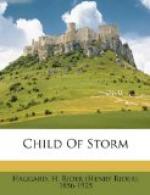Indeed, something of this sort did happen, for about midday we heard a footfall, and perceived the figure of a man, whom by his head-dress we knew for an Amakoba, threading his way through the bush. Before he saw us he was in our midst. For a moment he hesitated ere he turned to fly, and that moment was his last, for three of the Amangwane leapt on him silently as leopards leap upon a buck, and where he stood there he died. Poor fellow! Evidently he had been on a visit to some witch-doctor, for in his blanket we found medicine and love charms. This doctor cannot have been one of the stamp of Zikali the Dwarf, I thought to myself; at least, he had not warned him that he would never live to dose his beloved with that foolish medicine.
Meanwhile a few of us who had the quickest eyes climbed trees, and thence watched the town of Bangu and the valley that lay between us and it. Soon we saw that so far, at any rate, Fortune was playing into our hands, since herd after herd of kine were driven into the valley during the afternoon and enclosed in the stock-kraals. Doubtless Bangu intended on the morrow to make his half-yearly inspection of all the cattle of the tribe, many of which were herded at a distance from his town.
At length the long day drew to its close and the shadows of the evening thickened. Then we made ready for our dreadful game, of which the stake was the lives of all of us, since, should we fail, we could expect no mercy. The fifty picked men were gathered and ate food in silence. These men were placed under the command of Tshoza, for he was the most experienced of the Amangwane, and led by the three guides who had dwelt among the Amakoba, and who “knew every ant-heap in the land,” or so they swore. Their duty, it will be remembered, was to cross the valley, separate themselves into small parties, unbar the various cattle kraals, kill or hunt off the herdsmen, and drive the beasts back across the valley into the pass. A second fifty men, under the command of Saduko, were to be left just at the end of this pass where it opened out into the valley, in order to help and reinforce the cattle-lifters, or, if need be, to check the following Amakoba while the great herds of beasts were got away, and then fall back on the rest of us in our ambush nearly two miles distant. The management of this ambush was to be my charge—a heavy one indeed.
Now, the moon would not be up till midnight. But two hours before that time we began our moves, since the cattle must be driven out of the kraals as soon as she appeared and gave the needful light. Otherwise the fight in the pass would in all probability be delayed till after sunrise, when the Amakoba would see how small was the number of their foes. Terror, doubt, darkness—these must be our allies if our desperate venture was to succeed.
All was arranged at last and the time had come. We, the three captains of our divided force, bade each other farewell, and passed the word down the ranks that, should we be separated by the accidents of war, my wagons were the meeting-place of any who survived.




